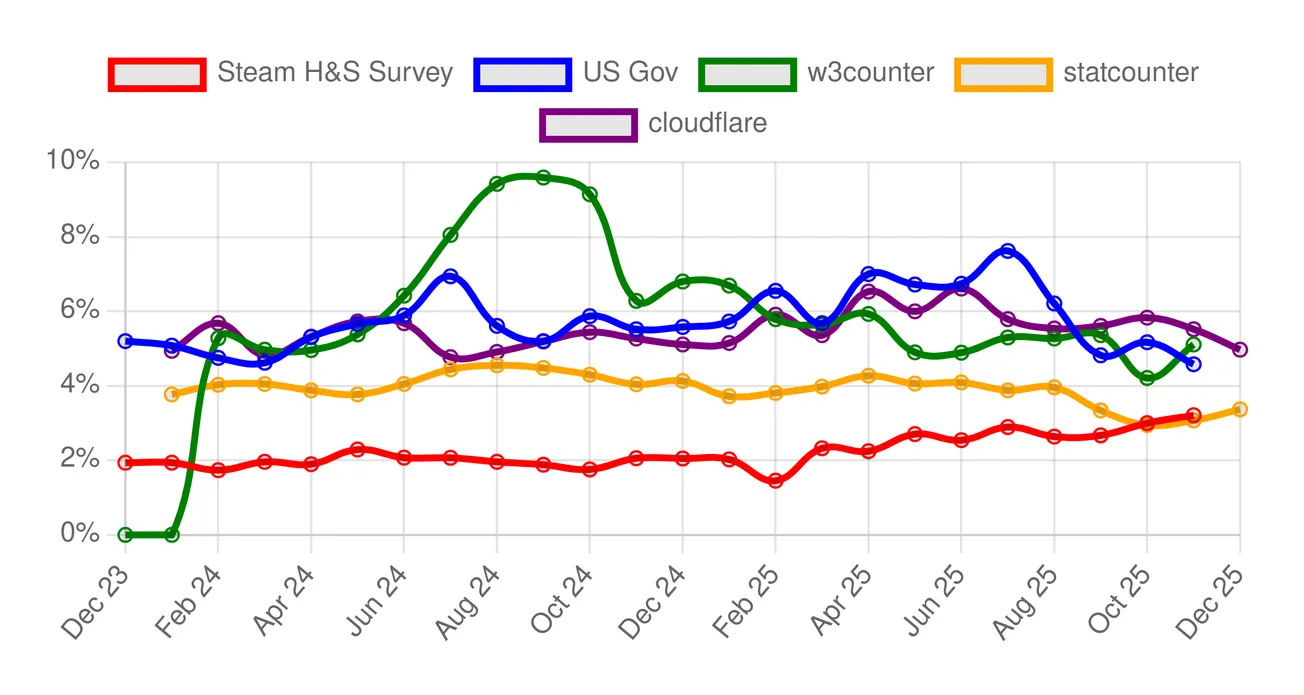Table of Contents
I haven't published a video in a while, which means that I've missed out on all of the juicy drama of the past months. Let's catch up right away.
This is Omarchy. It's a "Beautiful, Modern & Opinionated Linux" by the creator of Ruby on Rails. It uses Hyprland on top of Arch, and whichever company promotes it, such as Frameworks, is up for some drama.

The issue is with the author, David Heinemeier Hansson. He does many things: he wrote four books, he's an investor in Danish startups, he's been on the Lex Fridman podcast, The Primagen's, and many more.

As Ruby developer Tom Stuart puts it in a 2014 lightning talk,
DHH is an intelligent and successful person. DHH invented ruby, and now I can get paid for writing ruby even though I enjoy it.
He also says, shortly thereafter:
DHH is the Fox News of Ruby. He's noisy, he's reactionary, he's anti-intellectual, he's very sure he's right and he enjoys being rude.
Maybe I should've mentioned that the name of the talk is "The DHH problem".
Things haven't changed much: ten years later, we've seen an open letter to the Rails Core team and Ruby community asking to cut ties with David.

This open letter has been signed by many: ruby maintainers, the co-founder of discourse and Stack Overflow, and more. However, it was ultimately unsuccessful in achieving its intended purpose or raising enough support.

Indeed, David's Arch-based Linux distribution is becoming extremely popular, and David claims to have a wide range of opinions, going from left-leaning to right-leaning, but all moderate and reasonable. And, if you haven't been following closely, you might not be aware of exactly why so many people are angry at him. So let's clear this up.
Mosaic of positions
David believes that Israel's occupation of Palestine is an apartheid regime, that Abortion should be legal and accessible (with some restrictions) and that structural racism is a big problem in America.

He says,
If you take just those three, you're going to form an impression of someone on Team Liberal/Left.
He also believes that Russiagate was a mass delusion, that Parler's eviction from the internet was wrong, and that Trump was mostly right on trade with China.

But, at the same time, he thinks that cars don't belong in cities, that climate change is a catastrophic problem, and that bitcoin is bad. He also dislikes the usage of the word "snowflake" as an insult, and he believes it should be a compliment.

Why is he listing all of these takes? Well, his claims is that - just like everyone - he is a mosaic of different positions, some of which are more or less liberal, some of which are more or less controversial.
I agree with many of these takes - namely, all of the ones he presents as left-leaning. I'd also be willing to debate some of the right-leaning ones.
As an example, I do think that companies like Google and Apple can decide that they don't want to host right-wing social networks like Parler, and that is not related to freedom of speech. At the same time, I think that raises a question on the centralization of the web, and that we should be careful with allowing companies to fully control which apps can run on a given operating system. I'm happy that the EU is forcing Google and Apple to allow third party application stores and payment services. I think this would be an interesting discussion.

The same goes for Russiagate; I don't think it was a mass delusion at all, but I do think some aspects of it were overblown, and I'd find it personally very interesting to read a writeup (or, as many people call them, a book) on the topic, even though me and David are clearly on different starting points on this issue.
Well, is David up for debate on these topics? Yes, but. He says:
There are very few people who I'd willingly sit down to have a good-faith, substantial discussion with about those. Because the odds are that we'll run sour quickly. Those debates need the right context, the right people, the right frame of mind. And at work? No, never. Especially at work! Especially because work involves all sorts of delicate power balances already.
This sounds reasonable, though we'll discuss it later on. But right now I'd like to emphasize the narrative he's trying to create. Funnily enough, I'm not someone who likes to discuss politics, even though I actively take part in it: different people often have such different references and worldviews that it's hard for me to constructively build a discussion, and I agree that it's too easy to hit an identity bedrock and make no further progress. This is to say: I understand where he's coming from.
And indeed, he believes in this so strongly that he backed the decision by Basecamp CEO to ban societal and political discussions from within the company (David is Basecamp CTO and co-owner). The reasoning was the following:
Today's social and political waters are especially choppy. Sensitivities are at 11, and every discussion remotely related to politics, advocacy, or society at large quickly spins away from pleasant. You shouldn't have to wonder if staying out of it means you're complicit, or wading into it means you're a target. These are difficult enough waters to navigate in life, but significantly more so at work. It's become too much. It's a major distraction.
And indeed, David adds the following in a dedicated blogpost about this topic:
Basecamp should be a place where employees can come to work with colleagues of all backgrounds and political convictions without having to deal with heavy political or societal debates unconnected to that work.
He suggests that willing coworkers continue with political discussion, but he encourages them to do so using other platforms, such as Signal.

Of course, David still encourages employees to be active in politics outside the workplace, and he's active too, with his mosaic of positions.
He himself claims that his positions that end up receiving most pushback are "the most banal, mainstream positions".

And he repeats that:
[...] because you have some mainstream political takes on [...] immigration in Europe or any other topic that there might exist out there shared with literally millions of completely ordinary people.
A message just ever-so-slightly undermined by the fact that it was said during a video collaboration with Lunduke, someone who's against vaccines, denies climate change, thinks the 2020 elections were rigged, and thinks being trans is a sexual fetish – a set of views that's not quite "banal" or "mainstream", especially outside the US.

And really, this is where I'd like to start pushing back on the claims David has made so far. I'd like to argue that banning political discussions in the workplace is not effective, that the dislike towards him is not entirely based on politics, that his controversial views are not mainstream or banal, and - finally - that his "mosaic of opinions" tends heavily to the right. Let's go step by step, then.
The right to be rude
The most controversial political takes by David were published on his blog between 2020 and now; therefore, if we want to set that aside, we can go back in time and see what people thought of him back then.
I've already mentioned the "The DHH problem" talk from 2014, which does not talk about politics at all. I recommend that you go check it out - it's merely three minutes long - but I'll quote here the important part:
DHH is the Fox News of Ruby. He's noisy, he's reactionary, he's anti-intellectual, he's very sure that he is right, and he enjoys being rude.
Just like Fox News, DHH appeals to "common sense" and makes a show of being "far & balanced", but in reality his arguments use aggressive rhetoric and rely on a fixed viewpoint. To pick a topical example: is TDD hard in rails apps because TDD IS DEAD, or because rails makes TDD hard? Is TDD not worth the effort because TDD IS DEAD, or because the complexity of seftware can be managed more effectively if you only work on one product for which you control the requirements?
If we only listen to DHH then we'll never know, because DHH is just one person and he only has DHH's experiences. All I'm saying is, the Ruby community is large and diverse and thoughtful and that is why I love it. Please listen to DHH, his experiences are valuable, but DHH does not speak for me, and he probably doesn't speak for you.
Even before this talk, in 2008, Jeff Atwood (co-founder of Stack Exchange and Discourse) wrote a blogpost titled "Douchebaggery", all about DHH.

Again, you're invited to check it out, but to quote the important part:
Of course, as David has said many, many times, he doesn’t care whether we agree with him or not. [...] if you accept the premise that this kind of statement won’t change anyone’s mind, and is ultimately ineffective – even counterproductive – what are we left with? What purpose does the statement “stigma of being a Windows developer” serve? I can only think of one: David gets off on putting other people down.
And that makes him kind of a douchebag.
Going even earlier, in a 2007 blogpost by Rob Conery (linked in the above quote), we get:
The Rails dudes are pretty damn smart. But they’re also pretty damn arrogant. As DHH says:
"I’m not in this world to create Rails for you. I’m in this world to create Rails for me and if you happen to like that version of Rails that I’m creating for me, than you are going to have a great time."
One of the more shocking presentations I’ve ever seen involves DHH telling his audience who he’s writing Rails for, and why he doesn’t really listen to the community when they suggest where he should take it
And this is the image from that talk that's quite popular when criticizing David.

Again, my goal here is not to perform some character assassination of DHH, but I do think that multiple reports of David being rude and arrogant will partly explain some of the negative sentiment towards him and part of his politics past-2020.
The No-Politics
Let's get back to the "No politics in the workplace" rule in Basecamp. I would now like to argue that it's a very ineffective rule to apply.
The Verge has published a great article on the causes and consequences of this choice; again, you're recommended to go check it out.

Firstly, let's talk about the cause:
Basecamp customer service representatives began keeping a list of names that they found funny. Many of the names were of American or European origin. But others were Asian, or African, and eventually the list [..] began to make people uncomfortable. What once had felt like an innocent way to blow off steam [...] increasingly looked inappropriate, and often racist.
Of course, this sparked some internal discussions, and the rule was introduced to shut them off. However, some employees claimed that the only political discussions happening at Basecamp were about the company itself:
“At least in my experience, [the discussion] has always been centered on what is happening at Basecamp,” said one employee [...]. “What is being done at Basecamp? What is being said at Basecamp? And how it is affecting individuals? It has never been big political discussions, like ‘the postal service should be disbanded,’ or ‘I don’t like Amy Klobuchar.’”
And indeed, I think it's impossible to drive forward a company or organization without making explicit political choices.
Suppose, for example, that someone intentionally misgenders someone else. You could ban that person from the community or warn him, which would be seen as a political decision (and, as we'll see, DHH would disagree with the ban). Alternatively, you could ignore the misgendering, which would also be a political stance (you'd either not consider misgendering as a form of harassment, or you'd think that it's better to have free speech rather than a harassment-free organization or workplaces, both of which are quite political takes).
This is a rather specific example, but it's just one of many. Moderation requires constantly making political choices, and the same applies to building an international product: these kinds of issues will arise and have to be discussed.
The discussion around the list of names is a good example; Jane Yang, data analysis at Basecamp, makes another:
She said, the company’s profit-sharing plan gave more profits to people who have longer tenure — a group that is majority white and male. Making that discussion off-limits internally could ensure that inequality in profit sharing becomes a structural feature of the company.
Basecamp even let a Chicago mayoral candidate use their offices as campaign headquarters in 2018.

After the no-politics rule was announced, one employee wrote an open letter to Jason and David, which highlights even more political disagreement between them and the employees, and how they handled it:
[...] when our Use Restrictions Policy was first officially rolled out, neither hate speech nor harassment were included. One of my colleagues [...] and I [...] had debated vigorously for their inclusion, with David in writing while Jason gazed from the sidelines, intellectually making our case before ultimately being told: no.
In the end, banning political discussions simply means handing over the entire political power to the higher-ups of the company without allowing for pushback on any action, and it's telling that this happened two weeks after some employees started fighting back on DHH's accountability over the above mentioned list of names.
The Politics
DHH politics are anything but banal and mainstream. Let's see why, in detail.
One post of his that's often quoted is titled "As I Remember London". He makes multiple debatable claims. As an example, he writes:

London is no longer the city I was infatuated with in the late '90s and early 2000s. Chiefly because it's no longer full of native Brits. In 2000, more than sixty percent of the city were native Brits. By 2024, that had dropped to about a third. A statistic as evident as day when you walk the streets of London now.
There are so many wrong things with this statement.
Firstly, the linked Wikipedia page claims that 59% of London's population was born in the UK, which seems to be in contrast with the idea that only a third is "native Brits". This comes from the 2021 census, and I have not found any more recent data about it.

Apparently, the criteria for being "native" run a little deeper than just being born in the UK. You could argue that, to be "native", your family needs to have lived in the UK for a certain number of generations. However, we don't have data about that: how did DHH come up with the "one-third" number?
My suspicion is that he's going after this graph, only counting "White British" as native Brits. I don't see any other way to interpret the data in a way that supports his data.

However, this is insanely misleading.
As an example, in 1981 and 1991 we know that 13% and 19% of London's population were already non-White, so I don't think we can dismiss all non-White as also non-native Brits (as the 2021 census also suggests); and this data was conflating "White British" and "White Other", which were later split apart.

He also considers all "White Other" ethnic groups to not be native Brits, which is particularly weird because he claims he can see how many people are native Brits by just walking through the streets of London.

Which seems to be an elegant way to write: when you walk the streets of London now, there are too many Black and Asian people, and not enough White people. I don't know how else to read this. It's weird to point at both white and non-white people, born and raised in London's culture, and claim that they are a problem (how would that be the case?).
And yet, according to DHH, what's happening is a "demographic nightmare". Another paragraph reads:
Which brings us back to Robinson's powerful march yesterday. The banner said "March for Freedom", and focused as much on that now distant-to-the-Brits concept of free speech, as it did on restoring national pride.
Again, let's stop. If you're not a "native Brit", you might need a reminder of who Robinson is.
He assaulted an off-duty police constable who had intervened in an argument between him and his girlfriend. He also assaulted another man in 2011.

In the same year, he was convicted of threatening, abusive, or insulting language for leading a group of football supporters into a brawl involving 100 people.

The following year, he was arrested for having entered the United States illegally, which is somewhat ironic. He had entered the US with a forged passport because he had been banned from entering the US due to his criminal record.

He was also charged with three counts of conspiracy to commit fraud by misrepresentation in relation to a mortgage application, to which he pleaded guilty. The fraud amounted to 160,000 pounds, and the judge described him as the "instigator, if not the architect" of frauds for a total of 640,000 pounds.

In 2021, Robinson went to the home of a journalist, accused her partner of being a paedophile, and threatened to return every night. He was issued an interim stalking ban order and later convicted of stalking the couple.

And, on top of that, in 2025, he was also charged with harassment causing fear of violence against two Daily Mail journalists in 2024, though he pleaded not guilty here.

There's much more, but we can stop here with the criminal charges for now. Politics-wise, Robinson has described himself as opposed to Islam, he promised to retaliate against every single Muslim, and he called for the blanket deportation of every adult male Muslim recently immigrated to the UI.

During the protest that DHH is describing, Robinson claimed that:
It’s not just Britain that is being invaded, it’s not just Britain that is being raped. Every single Western nation faces the same problem: an orchestrated, organised invasion and replacement of European citizens is happening.
During the same "powerful" march, we also heard statements like:
They are demanding the sacrifice of our children on the altar of mass migration. Let’s not beat about the bush — this is the rape, replacement, and murder of our people… Remigration is possible, and it’s up to us to make it happen. We are Generation Remigration.
For those wondering, "Remigration" means "ethnic cleansing via the mass deportation of non-white immigrants and their descendants, sometimes including those born in Europe, to their place of racial ancestry".

This is the political leader and their march that DHH is explicitly supporting. And he tries to explain that this gathering was completely "normal and peaceful", and that they should not be defined as far-right.
The easy way out of this uncomfortably large gathering of perfectly normal, peaceful Brits [...] is to tar them all as "far right". That's not just a British tactic, but one used across Europe [...].
However, if the Great Replacement theories, ethnic cleansing, and forceful mass deportation, mixed with strong nationalism, aren't far-right, then I do not know what is.
Now, weirdly enough, I do agree that labeling all participants as far right is probably incorrect, as all rallies have significant variance within it. However, the leadership and organization hearth of the rally that David specifically supports, such as Robinson, is objectively far right.
DHH goes on to complain about totalitarianism in the UK:
The totalitarian descent into censorious darkness in Britain has been as swift as its demographic shift. British police are now making 30 arrests a day for wrongthink, wrongspeech, and other online transgressions against "the regime narrative", as the BBC would have reported, if this were a statistic from a foreign nation.
Please note that this is false. The arrests are for communication that contains threats to assault other people, false rumors that someone has committed crimes, sending multiple messages with abusive language, false bomb threats, mocking tragedy in a way that's grossly offensive to the victim or to the public, and so on.

On top of that, the law that the article was referencing has already been repealed and replaced with the Online Safety Act in 2024, so it's no longer relevant.

Furthermore, the Crown Prosecution Service makes sure that free speech is safeguarded, even speech that offends, shocks, and disturbs (as covered by the European Convention on Human Rights).

As Emma Monk, who wrote a detailed blogpost about this, states:
People are not being arrested, let alone charged, for stating their political opinions on Facebook. As yet, I’ve not come across a single “thought police” story that has turned out to be true.
As examples, she mentions that claims of arrests due to criticism of a local councillor turned out to be actually caused by an accusation of harassment.
DHH also provides his own example:
Most recently, five officers(!) came to arrest comedian Graham Linehan for illicit tweets. When much of the media reports a story like this, it's often without citing the specific words in question, such that the reader might imagine something far worse than what was actually said. So you should actually read the three tweets that landed Linehan in jail, and earned him a legal restraining order against using X. It's grotesque.
The incriminated tweet says the following:
If a trans-identified male is in a female-only space, he is committing a violent, abusive act. Make a scene, call the cops and if all else fails, punch him in the balls.
Which is an invitation to violence.
It's worth saying that Twitter itself had already permanently suspended his account after repeated violations of their rules against hateful conduct and platform manipulation. Linehan evaded that ban by creating a fake account that impersonated a transgender man. That account was also banned, but he created another.

Linehan was reinstated on Twitter in 2022, when Elon Musk took over the platform. However, he was banned again when he tweeted the words "Durr imm gonna kill em", referring to trans right activists. Again, his account was later reinstated.

Finally, it's worth stating that the bail condition not to post on X that DHH is mentioning only lasted one week, and he was released with no charge.
All in all, if the UK government is attempting to be a totalitarian state, I don't think they are doing a good job: the worst they could do to someone who's very clearly opposed to them and who has multiple times (jokingly) incited violence, is to briefly detain him and then not let him use Twitter for a week.
Getting back to the post, DHH then starts to explain why he thinks that non-native Brits are a problem. He states:
I really feel for the Brits because it's not obvious how they get themselves out of this pickle. They're still reeling from the Pakistani rape gangs that were left free to terrorize cities like Rotherham and Rochdale for years on end with horror-movie-like scenes of the most despicable, depraved abuse of British girls.
And, similarly,
Unwilling to just let their society wither away while their bobbies chase bad tweets instead of the rampant street thefts or those barbaric rape gangs. Unwilling to resign the rest of the country to the kind of demographic replacement that befell London over the last two decades.
Again, I find these examples misleading.
As an example, according to the Centre of Expertise on child sexual abuse report of 2023/2024, White British people are actually over-represented in comparison with the general population of England and Wales.

This means that a higher population of non-white people would predict a lower amount of child sexual abuse, though the correlation is low enough that it wouldn't be by a significant number. As the Jay report about the Pakistani rape gangs writes,
[...] there is no simple link between race and child sexual exploitation, and across the UK the greatest numbers of perpetrators of CSE are white men.
Bringing up single examples, regardless of how popular they might be, cannot change the broader statistics.
Jake Lazaroff wrote a blogpost about the topic, which ends very appropriately:
Let’s ditch the superlatives and review David’s post objectively:
He thinks that even if you were born in the UK, you only count as British if you’re white.
He wouldn’t consider living in London specifically because it has too many people of color.
He uses racist tropes to accuse Asian men of being dangerous predators who attack white women.
He pushes debunked conspiracy theories about immigrants replacing white people.
He finds a march where speakers called for banning all non-Christian religions and ethnically cleansing immigrants “heartwarming”.
Finally — and maybe most alarmingly — he argues that all of the above is normal and not extreme.
I would also like to recommend the blogpost by Paul Jensen on the same topic.
Now, I've been focusing a lot on this post because I believe it's the best example of the attempt to pass far-right policies as "common sense"; however, we have to take a step back and check the bigger picture.
Outside of London
Even though David claims to be a mosaic of opinions ranging from left-leaning to right-leaning ones, in his blogposts he seems to more often lean one specific way.
As an example, he wrote two blogposts to celebrate the waning days of DEI and wokeness.

He also wrote an entire piece on why Trump's second term finally brought back some optimism to him, writing "we're so back".

He also complained that students at the Copenhagen International School had the option to join a student-led support group for students who identify as part of the LGBT community. This feels particularly wrong to me, as otherwise David is highly in favor of free speech above everything else; however, when students self-organize to give other students the option to talk about progressive topics, he jumps in to say that this shouldn't be happening.

Throughout his posts, we can find hints of nationalism and nostalgia towards the past. There's a piece praising America's freedom, where the God Bless the USA song is quoted in full as it rings poetically true.

Which would be fine, obviously, if only it wasn't justified with misinformation about other countries. As an example, we see again mentions of
Fast-track tribunals [have been] setup to hand out unbelievably harsh sentences for such terrible offenses as "anti-establishment rhetoric", criticisms of mass migration, and "obscene gesticulations at the police".
in the EU and the UK. There's also criticism of the EU for
threatening the owner of X, Elon Musk, with severe consequences if he does not abide by its arbitrary definition of what defending us all against "misinformation" and "hate speech" looks like.
"Threat" is a weird word to use here, since the EU only "threatened" to apply the existing laws (we all live under that "threat").
Furthermore, the letter he's talking about was in the context of riots that took place in the UK triggered by disinformation related to a fatal stabbing attack.

More specifically, posts went viral claiming that a murderer was Muslim, a refugee and/or a migrant. None of that was true: the perpetrator was born in the UK in an Evangelical Christian household. And yet, this false information was promoted by people like Adrew Tate and Elon Musk himself.

Thus, I feel like the EU had some legitimacy in warning Twitter about their amount of false information, given that one of the first thing Elon did was to dismantle safety guardrails aimed at curbing hate speech and disinformation, and doing mass layoffs of content moderation staff.

And, talking about Andrew Tate, DHH somehow felt compelled to write a blogpost to defend him, complaining about the dicothomy of "are you for or against Andrew Tate" and claiming that it's important to allow him his free speech. David says,
You don't have to like any of Andrew Tate's takes on men, women, wealth, or the world to see that this modern, coordinated unperson campaign against his "wicked words" is crazy.
It's worth noting that Tate was arrested on suspicion of rape in 2015, harassed a political activist by forcefully kissing her in 2018, kept two women in his apartment against their will and was then charged with human trafficking in continued form, he was investigated with trafficking minors, sex with a minor, money laundering and attempting to influence witnesses, and then his ex-girlfriend accused him of chocking and beating her.

I feel like this goes a bit beyond the "he has some bad opinions about women" stage.
This video is getting extremely long already, but it's worth making one further example and then move on. There are many posts where he seems to be overly confident, talking about seemingly absolute truths whilst not knowing much of the topic itself.
Take, as an example, his reaction to this ad from Calvin Klein, which appeared during the "2020 insanity" (as he calls it):

I passed it every day biking the boys to school for weeks. Next to other slim, fit Danes also riding their bikes. None of whom resembled the grotesque display of obesity towering over them on their commute from Calvin Klein.
That's the problem with the whole "representation" narrative. It proposes we're all better off if all we see is a mirror of ourselves, however obese, lazy, ignorant, or incompetent, because at least it won't be "unrealistic". Screw that. The last thing we need is a patronizing message that however little you try, you're perfect just the way you are.
Which, in my opinion, completely misses the point and makes a false equivalence between obese and lazy/ignorant/incompetent! We tend to project our personal situation onto others and assume they work the same as us; but they don't. It's easy for some of us to stay within a medically healthier weight range, as we don't have to actively fight against our own metabolism, instincts, and environment. The worst that could happen is that we gain some weight due to bad nutrition habits, and we can diet to get down a bit – how hard was that?
But other people work differently, and they might not have access to the required food for a healthy diet, or be in the economic position to afford it. Their body might also be unconsciously targeting a higher ideal weight, which means that the same meal that makes me full might leave somebody else still hungry.
And it's not as easy as exercising more, since physical workouts have a smaller impact on our calorie consumption than we'd expect, plus people who weigh more tend to also burn more calories every day in the first place. None of this is their fault or decision.
Therefore, getting back to what we call a "normal" weight range is more akin to what would be, in my experience, starving myself until I'm severely underweight, which is not something I'd be able to willingly do.
The point of representation is not to prevent people from working towards a healthier/better lifestyle, but rather to recognize that different people live different struggles; the first step to work on them is to acknowledge that it's perfectly normal to live with them. Your value as a person is not defined by your weight.
However, when you read DHH post, it reads as if obese people were just stupid folks who could just bike to work and have a slim body. And he comes off as overconfident and quite arrogant in his belief.
And he does this constantly! In another blogpost, he claims that ADHD is just an excuse to be lazy. I'm paraphrasing here, but not too much. Again, he is projecting his own personal experiences onto others. He does not have ADHD; therefore, nobody has. (Don't get me started on this topic or this video will be an hour long.)

Let's focus on free speech, then.
RubyConf and Ruby World
I would like to enter this section with this famous xkcd comic. I'm assuming you've heard about it before, but let's have it here, just for sure.

In 2022, David received the following email from Ruby Central, which was organizing the annual RailsConf.
With you having been mostly offline the last year, the program committee has decided it would be valuable for the community to start sharing the opening keynote stage with other contributors. We have a few in mind but if you have any suggestions of people who have been impactful this year, please share them.
This was David's reaction to the email:
It's a real shame that this is the world we find ourselves in now. One so sharply divided by politics and ideology that we can't even share the love of Ruby on Rails together at a conference without a need to settle scores.
Should companies that support RailsConf by sending employees, speakers, or sponsorship money expect retaliation or exclusion if they end up transgressing against whatever shrinking ideological ring surround the organizers or program committee?
Now, let's blindly assume that David is right in assuming that the organizers are lying about the reason for not asking him to host the 2022 keynote.
Even so, Ruby Centrail is under no obligation to invite people to keynotes who are claimed to be actively rude towards others and racist/nationalists. I don't find that choice to be particularly surprising myself.
Should companies that support RailsConf expect retaliation if they make openly racist/nationalist statements? How could they not expect retaliation?
As a result of this choice (and other factors too), in 2022 he co-founded the Rails Foundation, of which he is the chair. One of the first things the new Foundation did was to organize a competing Rails conference, called Rails World.

The conference was a success, with more than 700 developers attending in its very first year.

This meant that there were two Rails conferences: Rails World, organized by the Rails Foundation, and RailsConf, organized by Ruby Central. DHH chairs the Rails Foundation, but he's also the CTO of Shopify, one of the main sponsors of Ruby Central.
However, the space for Rails conferences isn't that big, and Ruby World eventually won it over. RailsConf, after not inviting David in 2022, had to shut down in 2025.

For its very last RailsConf, Ruby World decided to invite DHH back "for a special fireside chat".

This was received very negatively by the community, with many complaining about Ruby Central now deciding to platform a "white supremacist". (Is DHH a "white supremacist"? You can judge it for yourself, but I think you could easily argue he is).

Even beyond the internet outrage, the choice to platform him angered one other sponsor of Ruby Central, Sidekiq, who decided to withdraw its $250,000/year sponsorship. You don't have to wonder their explicit reason, as its creator was pretty clear.

Ruby Central suddenly found itself in a dire economic situation and without a Rails conference.
According to a reconstruction by Joel Drapper, Shopify (which has DHH on its board) asked Ruby Central to perform a hostile takeover of RubyGems code. Without getting technical, RubyGems were already hosted by Ruby Central, but the code repositories weren't, and Shopify reportedly wanted the organization to have full control over them.

You can read the full write-up to see exactly how it happened, but the gist is that the Ruby Central board voted to take over the project and succeeded. Reportedly, Shopify explicitly asked one of the RubyGems maintainers, André Arko, to be excluded from returning to the project.

Here's what one Ruby Central board member had to say about the vote:
if I had voted the other way, I felt I’d be voting to start the process of shutting down Ruby Central.
After the hostile takeover was publicly announced, DHH stated that he was happy to see it:
Ruby Central is making the right moves to ensure the Ruby supply chain is beyond reproach both technically and organisationally.
This concludes my quick recap of the recent drama in the Rails world. As a result of all of this, it seems that Ruby Central now finds itself in an extremely weak position, with the Rails Foundation taking over its conference and finding itself economically dependent on its sponsors to the point of performing hostile takeovers.
Conclusion
Well, I said everything I had to say. I hope that now you will understand the hostility that many people in this community have towards DHH, his ideas, and his projects.
I originally planned a longer conclusion, though I feel like this article took way too much time already. But, briefly, I think we should be careful when people present themselves as merely having common-sense opinions, and then start slowly drifting towards right-wing conspiracy theories like the Great Replacement.
This, however, does not mean that we should be overly aggressive towards everyone who has "moderate" opinions (whatever that might mean!). As an example, I've done an entire video about Hyprland and its developer, Vaxry. In my very humble opinion, he has made some mistakes in the past but managed to mostly move past them; he still has some ideas that I consider somewhat childish (sorry, Vaxry!), but he's definitely not a fascist, white supremacist, or anything like that.
However, when Frameworks decided to sponsor Omarchy, Ladybird, and Hyprland, all three were considered fascist by some people, and there was even a (troll-ish, I hope) proposal to add a fascism checker systemd plugin.

When I posted about this on Mastodon, I was told that I'm whitewashing Ladybird and Hyprland, doing pedagogy, and more. And yet, I think it's strictly necessary to still be able to distinguish fascism from conservative people.
DHH often feels like the former.










